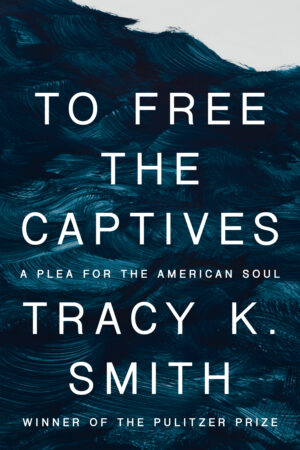To Free the Captives: A Plea for the American Soul
by Tracy K. Smith
reviewed by Eunice Lee
Tracy K. Smith’s latest essay collection, To Free the Captives: A Plea for the American Soul, makes the case for optimism. Conjuring up histories of Black resilience—through national and familial archives, searingly personal anecdotes, and ancestral wisdom—the former Poet Laureate of the United States reminds us:
History is not something to run from. No. It has held us, birthed and nursed us. And if its wild heat is not content to recede, perhaps it makes sense to stoop down, gather it up in my own hands, and carry some piece of it—some wriggling kit or pup—forward.
Smith imagines a mutually sustaining relationship with history: it has “nursed us” through adversity, and we too can “carry” its vulnerable body to safer ground.
This act of optimistic care, unlike toxic positivity, demands patient and nuanced retrospection. Documenting Smith’s family history in the context of American race relations, the six essays and coda take us through both grief and joy: the joy of encountering her great- and great-great-grandparents’ names, birthdates, and occupations in the 1900 and 1920 census records; her grandfather’s service in World War I, and the failed promises of belonging made to Black Americans who fought and labored for their country; the Jim Crow legacies confronted by her parents, a NASA-employed avionics engineer and an HBCU-educated teacher, whose cosmic wisdom later guides Smith through her own odyssey as a daughter in mourning, as a young poet (and sometime raver) in Cancún and the Bay Area, as a mother of three striving towards sobriety and accountability, and as an educator bearing witness to COVID-19 and Black Lives Matter. From the Alabama woods, World War I barracks, and the Hubble Space Telescope lab, to the nightclub, the ICU, and the reading room, the book traces the “tireless tradition” that has sustained Smith and her community.
Smith takes up the task of telling this history through—but more often, despite—institutions of power. Some institutions propagate mythic and racist representations of Black lives, while others are legal and economic. Whether at heavily policed libraries at elite schools, or on a guided tour of a Southern plantation where she hears microaggressions, Smith is alert to institutional biases of all kinds. In a moment that feels especially resonant today, Smith writes: “An institution—a government, an industry, a bank, a church, a university—is not a family. But like parents and loved ones, institutions purport to be invested in our care. As with kin, we are bound to them.”
As a poet, however, Smith is hopeful that words may unbind us from hegemonic institutions. Subtle distinctions, like suffixes or differences in capitalization, can reveal powerful truths. The book arises from a reality in which the “Free” are granted a different form of being and belonging from the “Freed.” Freedom is a given for some, a contingency for others; some are “wanted,” others “Wanted.” Nursing her twin sons—born prematurely during a period of mourning for Trayvon Martin, a young Black life lost to racist violence—Smith reflects that each fragile baby is “cleft from and cleaving to the other,” and how a single word can connote both rupture and repair. In the final chapter, Smith is “captivated” by the beauty of Black equestrians (“the first American cowboys,” she reminds us) during a large family gathering in Mississippi, which renews her hope in a reclaimed, liberating lineage.
Smith believes in the “language of the soul,” and she is informed by traditions of Black and Christian spirituality. Subtitled A Plea for the American Soul, the book echoes the testimonies, tunes, intimacies, and soul-stirring landscapes of W. E. B. Du Bois’s The Souls of Black Folk. More importantly, she gestures towards an all-encompassing faith, religious or otherwise, in something bigger than one’s immediate reality.
What if our survival means learning to admit that we are bound to something outside of ourselves and outside of the time to which we belong? Not as a retreat or space from the experience of difficulty, but as a way of moving past the limits of fear, pain, and ego, and into the fullness of our actual selves—the fullness of actual reality? What if these are the terms of the freedom that we in this country so desperately seek?
If you’re seeking an affirmation that some bonds connect you to communities of care, that your soul is capable of (and responsible for) nursing history, just as it has nursed you, and that you do indeed have a soul, To Free the Captives is for you.
Published on May 21, 2024

